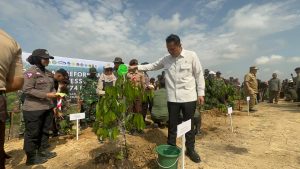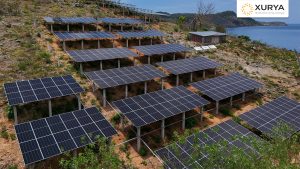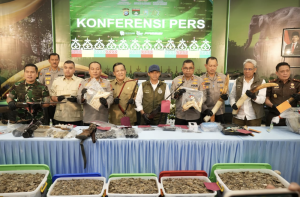Jakarta – The Institute for Essential Services Reform (IESR) has stated that the government’s proposal to revise Presidential Regulation (Perpres) 112/2022 on accelerating renewable energy for electricity supply is a step backwards that could prolong the operation of fossil fuel power plants in Indonesia. According to IESR, amid commitments to energy transition, the proposed changes open the door to the construction of new coal-fired power plants.
IESR CEO Fabby Tumiwa said on Friday, 14 November, that the draft revision could strengthen Indonesia’s dependence on coal and lead to higher electricity costs.
“System reliability does not have to be achieved by building new coal-fired power plants. A more extensive transmission network, plus the development of geothermal, hydro, solar, wind and energy storage can replace them,” said Fabby. He emphasised that this policy direction runs counter to President Prabowo’s directive, which aims for 100% renewable energy use within the next 10 years.
Fabby said that the revision of the Presidential Regulation should strengthen the commitment to phase out coal-fired power plants by 2050, not the other way around.
In the revised draft, the government is considering relaxing regulations on the construction of new coal-fired power plants to improve electricity reliability. Not only that, but hybrid power plant schemes that combine fossil fuels and renewable energy are also being included as an official option.
IESR reminded the government that coal-fired power plants are not the only solution for electricity reliability. The disruption at the Timor coal-fired power plant in November 2025 proved that even new power plants are not always problem-free.
Fossil fuel power plants extension and the risk of stranded assets
IESR emphasises that investments in coal-fired power plants today may become stranded assets or fall into disuse in the coming years as the global energy transition accelerates. According to IESR, this concept actually locks Indonesia into using dirty energy for longer.
IESR Energy System Transformation Programme Manager Deon Arinaldo said that there would be a significant risk of a surge in emissions if restrictions on coal-fired power plants were relaxed. “Electricity emissions could surge from the current average of 0.85–0.87 kgCO₂e per kWh. This would reduce the competitiveness of the Indonesian industry,” he said.
Deon added that export industries required to reduce their carbon footprint—including those in the European Union market—could leave Indonesia if electricity continues to rely on coal. “Many multinational companies, especially RE100 members, could hold back expansion or move away from Indonesia if we continue to rely on fossil fuels,” he continued.
In response, IESR has called on the government to return to the globally agreed energy transition path. They are urging the cessation of coal-fired power plant operations by 2050, the accelerated decommissioning of old and inefficient coal-fired power plants, a ban on the construction of new coal-fired power plants, including for downstream industries, the accelerated development of renewable energy supported by energy storage systems, and the expansion of the electricity grid. Thus, the revision of Presidential Regulation 112/2022 should not be a loophole to extend the lifespan of coal, but rather a real driver towards a clean and competitive energy system. (Hartatik)
Banner photo: Sander van der Werf/shutterstock.com















